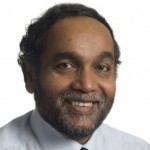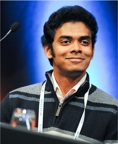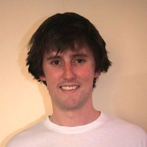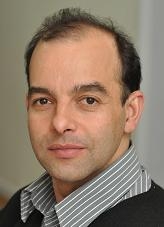| |
TUTORIALS
1. Implementing a new genre of eHealth system in a reticent environment”
This tutorial primarily focuses on the social aspects of implementing a novel eHealth systems called Accountable-eHealth (AeH) systems. The main focus of AeH systems is mitigating information privacy concerns whilst facilitating appropriate access to information for users, and is based on the principles of information accountability (IA).
Duration: 3hs
 |
Dr. Tony Sahama (B.Sc., M.Phil., PhD., M.Ed(HE)
Tony Sahama is a senior lecturer in the Information Security Discipline, Faculty of Science and Engineering. His research interest is in Health/Medical Informatics in particular, Healthcare Information Technology (HIT) and Clinical Decision Support Systems design and development. Tony holds a PhD in Computer Science (Computer Simulation and Modelling, DACE), Master of Education (Higher Education), M.Phil (Statistical Computation) and B.Sc. (specialised in Applied Statistics and Computer Programming). Tony has experience working with researchers in developing customised technological applications for Clinical Decision Support Systems, Data warehousing, Data Integration and IT applications for healthcare decision making processes. Currently, Tony is supervising 4 research masters and 4 PhD level projects in the Medical Informatics research area. Tony holds professional membership with ACM (SIGBioinforamtics), IEEE, IBS, ACS, SSAI and HISA. http://staff.qut.edu.au/staff/sahama/ |
| |
|
 |
Dr. Randike Gajanayake (B.Sc., PhD)
Randike Gajanayake is a postdoctoral research fellow at the School of Electrical Engineering and Computer Science at the Queensland University of Technology, Brisbane, Australia. Randike’s PhD thesis principally focused on the applicability of information accountability in the eHealth domain as a measure of information privacy and a measure to balance competing concerns arising from eHealth stakeholder requirements. Randike has published in a number of peer reviewed health informatics journals and conferences. |
 |
Shane Black is a Research student in the School of Electrical Engineering and Computer Science at the Queensland University of Technology, Brisbane, Australia. Alofi’s research focuses on eHealth-as-a-Service as an ICT enabled strategic framework providing trusted access to stake-holder centric, service-oriented heterogeneous EHR. Alofi holds a Masters degree in Information Technology from Queensland University of Technology. He has gained more than 20 years of industry experience in software development and enterprise computing. His areas of interest include Information Systems Management and Distributed Computing (SOA-based systems and Cloud Computing). |
2. Designing and implementing usable and useful Accountable-eHealth systems
This tutorial primarily focuses on the technical challenges surrounding the design and implementation of Accountable-eHealth (AeH) systems. The potential benefits of shared eHealth records systems are promising for the future of improved healthcare; however, their uptake is hindered by concerns over the privacy and security of patient information. In the current eHealth environment, there are competing requirements between healthcare consumers’ (i.e. patients) requirements and healthcare professionals’ requirements. While consumers want control over their information, healthcare professionals want access to as much information as required in order to make well informed decisions. This conflict is evident in the review of Australia’s PCEHR system [1]. Accountable-eHealth systems aim to balance these concerns by implementing Information Accountability (IA) mechanisms. AeH systems create an eHealth environment where health information is available to the right person at the right time without rigid barriers whilst empowering the consumers with information control and transparency, thus, enabling the creation of shared eHealth records that can be useful to both patients and HCPs. In this half-day tutorial, we will discuss and describe the technical challenges surrounding the implementation of AeH systems and the solutions we have devised. A prototype AeH system will be used to demonstrate the functionality of AeH systems, and illustrate some of the proposed solutions. The topics that will be covered include: designing for usability in AeH systems, the privacy and security of audit mechanisms, providing for diversity of users, the scalability of AeH systems, and finally the challenges of enabling research and Big Data Analytics on shared eHealth Records while ensuring accountability and privacy are maintained.
Duration: 3hs
 |
Dr. Tony Sahama (B.Sc., M.Phil., PhD., M.Ed(HE)
Tony Sahama is a senior lecturer in the Information Security Discipline, Faculty of Science and Engineering. His research interest is in Health/Medical Informatics in particular, Healthcare Information Technology (HIT) and Clinical Decision Support Systems design and development. Tony holds a PhD in Computer Science (Computer Simulation and Modelling, DACE), Master of Education (Higher Education), M.Phil (Statistical Computation) and B.Sc. (specialised in Applied Statistics and Computer Programming). Tony has experience working with researchers in developing customised technological applications for Clinical Decision Support Systems, Data warehousing, Data Integration and IT applications for healthcare decision making processes. Currently, Tony is supervising 4 research masters and 4 PhD level projects in the Medical Informatics research area. Tony holds professional membership with ACM (SIGBioinforamtics), IEEE, IBS, ACS, SSAI and HISA. http://staff.qut.edu.au/staff/sahama/ |
| |
|
 |
Mr. Daniel Grunwell (BIT)
Daniel Grunwell is a Research student in the School of Electrical Engineering and Computer Science at the Queensland University of Technology, Brisbane, Australia. Daniel’s research focuses on the technical implementation and design of Accountable-eHealth (AeH) systems. Daniel holds a degree in Information Technology from Queensland University of Technology.
|
3. Novel assistive technologies for basic communication and complex applications: Designing brain-computer interfaces to fulfill end users’ needs.
Communication and control can be particularly challenging tasks for persons with severe motor-impairments. Established assistive technologies often do not offer adequate solutions for this group of users. It has been shown that brain-computer interfaces (BCIs) allow for muscle-independent communication even for persons with complete paralysis (i.e. persons in the locked-in state). One of the most important goals of this emerging field is to provide users, who are being cared for at home, with long-term solutions that they can use as independently as possible. Ultimately, the applications should not only allow for basic communication, but also lead to e-inclusion by offering control over a variety of applications designed to fit the users’ needs, and therefore, improve their quality of life.
After providing a short introduction to the fundamentals of brain-computer interfaces, the tutorial will expatiate on state of the art applications and usage scenarios of administered BCIs in end user’s homes (as developed in EU-FP7 project BackHome). In this context, the issues of remotely administering such complex systems will also be addressed. Further, the tutorial will focus on methods for evaluation of usability that take into account the effectiveness, efficiency and satisfaction with the system, which is important for user acceptance of assistive technology in general. The tutorial will also include exemplary applications of BCIs for motor-rehabilitation, basic communication and detection of consciousness and close with ethical issues that arise when working with patients facing end of life decisions.
Duration: 3hs
 |
Dr Sebastian Halder, received the MSc degree in Computer Science and the doctoral degree from the University of Tübingen, Tübingen, Germany. Currently he is working as PostDoc at the University of Würzburg, Würzburg, Germany. He has worked at the Wilhelm-Schickard-Institute for Computer Science (Tübingen, Germany), Institute for Medical Psychology (Tübingen, Germany), Institute for Ophthalmic Research (Tübingen, Germany) and the Christoph-Dornier-Stiftung (Tübingen, Germany). His research areas are non-visual brain-computer interfaces, brain-computer interface aptitude and applications for brain-computer interfaces. He has published extensively in the field of brain-computer interfaces and is currently working as a senior researcher in the EU-FP7 project BackHome aimed to develop assistive technologies for independent home use.
|
| |
|
 |
Ivo Käthner, received the MSc degree in Psychology from the University of Bremen, Bremen, Germany. Currently he is working as PhD Student at the University of Würzburg, Würzburg, Germany. He has worked at the Department of Human Neurobiology (Bremen, Germany), Institute of Neuroscience (Dublin, Ireland) and the Institute for Medical Psychology (Tübingen, Germany). His research areas are non-visual brain-computer interfaces and mental workload during brain-computer interface usage. He is a member of the Graduate School of Life Sciences and is working as a research assistant in the EU funded project BackHome, where he specializes in the evaluation of user centered interface design.
|
4. Cloud Computing Technologies for the development of novel eHealth services: Easi-Clouds EU Project Approach
Many countries continue to face the major challenge of economically supporting their welfare systems, particularly medical/health benefits. This situation is even worst in countries where this system doesn’t exist at all. Integrated e-Healthcare technologies associated with a comprehensive health strategy can help to improve service quality of healthcare, reduce cost and improve the welfare of the whole society. The recent advances in cloud computing, telecommunication networks, medical sensors are envisioning new cost-effective solutions that could be deployed at large scale. The ITEA EU project EASI-CLOUDS aims at advancing cloud computing technologies to contribute to this endeavor. The objective of EASI-CLOUDS is to provide a comprehensive cloud computing infrastructure that can bypass all market barriers, help the emergence of new fast growing incomers to enter the market in particular in the eHealth area. The EASI-CLOUDS platform can be instantiated to set up eHealth applications on-demand for a private, public, or hybrid usage, and implementing a given level of security, privacy and QoS. Such instances will be able to interoperate in different ways and constitute a federation of cloud computing systems. Finally, the presentation will highlight examples of the instantiation in the Cloud of a Context Aware Pervasive Services to assist elderly and disabled people in their daily life
Duration: 3hs

|
Prof. Nazim Agoulmine (IEEE Senior Member and IEEE ComSoc Distinguished Lecturer) is a Full Professor at the University of Evry Val d’Essonne, France and head of the LRSM group - IBISC Computer Science Research Lab. Since 1989, he has been involved in several large research projects on cloud computing, broadband wireless and fixed networks funded by the EU commission: Advance, Pemmon, Forms, ICM, Adanets, Seimonet, Sumo, Wellcom, Expeshare, Easi-clouds) and the French National Research Council CNRS (Cesame, Amarrage, Polymage, etc.). His current research interests are ubiquitous networking, context awareness, autonomic systems, cloud computing, fixed and mobile networks, ad-hoc and WSN, multimedia communications with applications in various societal challenges (eHeath, eLearning, Smart Grid). He has served and still serving in several technical programme committees of IEEE international conferences: HEALTHCOM, MMNS, IM, NOMS App, LANOMS, ASNOMS, MWCN, LAACS, BCN, GIIS, etc. Nazim Agoulmine has served as the general co-TPC chair of IEEE HEALTHCOM’ 2012, IEEE/IFIP IM’2011, NATO ASIGE’2010, IEEE LANOMS’2009, IEEE BCN’2010/09/08/07/06, IEEE MMNS’2003 IEEE DANSM’2007, IEEE GIIS’2007, HPOV’2004 . He has published more than 100 peer-reviewed papers in the areas of networking and multimedia systems. He is the co-author of three books on Network Management and Multimedia Systems. He was awarded two international patents and has been giving several invited/keynote/plenary presentations in several international conferences and workshops. Dr. Agoulmine is currently a secretary a member of the e-Health IEEE Committee. He is also the area editor of the International Journal on Computer Networks - COMNET, associate editor board of the international Journal of Computing Science and Engineering - JCSE and member of the editorial review board of the “International Journal of E-Health and Medical Communications - IJEHMC. He was also the guest editor of two IEEE Communications Magazine Special Issues in 2012 on “Communications in Ubiquitous Healthcare: Wireless Sensors, Networked Devices, Protocols and Solutions” |
| |
|

|
José BRINGEL FILHO is Professor at State University of Piauí (UESPI), leader of the Omnipresent and Pervasive Systems laboratory – OPALA, and research fellow at the University of Evry Val d'Essonne (UEVE) and member of LRSM team (IBISC laboratory) led by Nazim Agoulmine. He received his B.S. degree in Computer Science from Federal University of Piauí (UFPI) in 2000 (Brazil), his M.S. degree in Computer Science from Federal University of Ceará (UFC – Great team) in 2004 (Brazil), and his Ph. D. degree in Computer Science from University of Grenoble (UJF – Steamer team) in 2010 (France). He was a NII Internship Student at the National Institute of Informatics (Tokyo – Japan) in 2009 (March-July), working under the supervision of prof. Ichiro Satoh. His research interests have included context-aware systems, quality and privacy of context information, context-based access control models, semantic-based knowledge representation and reasoning applied to ubiquitous and pervasive systems. |
5. Future Internet Platform Centered eHealth Service delivery
Future Internet Service Platforms, technical Director FI-STAR Project, Rechnische Universität Berlin, GermanyAmong various verticals that are typically associated with smart cities, like mobility, environment, utilities, public administration and safety, the integration of health care is a primary objective of local governments since the cost of health care is currently increasing faster than the GDP in most countries. In addition, societies globally are undergoing fundamental and unprecedented demographic changes, which amplify the healthcare delivery and expenditure challenges.
Europe has mobilized a significant part of its industry in a Public-Private-Partnership on Future Internet (FI-PPP), which is a European programme for Internet-enabled innovation. The FI-PPP will accelerate the development and adoption of Future Internet technologies in Europe, advance the European market for smart infrastructures, and increase the effectiveness and cost efficiency of business processes through innovative services and delivery mechanisms. This initiative aims among others to deliver technologies that respond to the current societal challenges.
In this context the FI-STAR project establishes early trials of services and applications in the health care sector by building on top of Future Internet Technologies developed in the programme. The project’s ambition is to augment smart cities infrastructures by creating a sustainable ecosystem for all stakeholders in the global health care and adjacent markets based on FI-PPP specifications.
FI-STAR is a unique opportunity to deliver standardised and certified software including a safe, secure and resilient application-delivery platform, taking advantage of all Cloud Computing and Big Data benefits and guaranteeing the protection of sensitive and personal data.
The tutorial will elaborate on the use of the FI-PPP technology for decentralized e-health services in smart cities and provide an insight on the effectiveness- and efficiency-gains achieved by the different stakeholders and across supply-chains centered on the eHealth Platform Provider. A practical, hands-on example of the creation and deployment of a generic health-telemonitoring application using the FI-STAR Platform will be given.
Duration: 3hs

|
Dr. Stefan Covaci is senior solutions architect for future internet services platforms at the computer sciences and electrical engineering faculty of Technical University of Berlin, Institute for Telecommunication Systems. Between 1990 and 2007 he was working at GMD FOKUS (today Fraunhofer Institute FOKUS) acting as director of the competence centre Intelligent Mobile Agents. He co-initiated and participated to the agent standardisation work of OMG (Object Management Group) and FIPA (Foundation of Intelligent Physical Agents), and was one of the co-authors of the first agent technology standard – the OMG-MASIF (Mobile Agent System Interoperability Facility). He has extensive experience in the management of a variety of projects and study contracts for the European Commission, German Agencies (BMBF, BMWF) and other industrial national and international organisations in the areas of IT and telecommunication networks and services. His recent work is in the areas of next generation networks infrastructures and service delivery platforms for the Future Internet with a focus on interoperability and management solutions. He is member of the Architectural Board of the European Future Internet Public-Private Partnership (Fi-PPP) and technical coordinator of the FI-STAR project – applying Future Internet technology in the Healthcare sector. He is the technical coordinator of the DAAD – UNIFI project enabling future internet academic teaching and research in developing countries. He has published over 90 papers and was chair or member of the program committee of many international conferences. |
|
|
PROGRAM AT A GLANCE >>
TECHNICAL
PROGRAM >>
KEYNOTE SPEAKERS >>
WORKSHOPS >>
TUTORIALS >>
|
|